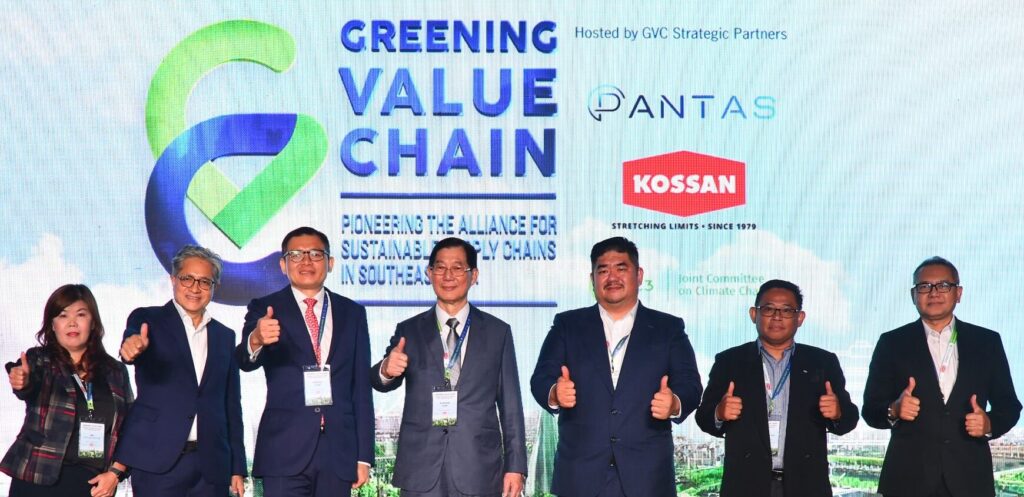
As the world faces the alarming consequences of climate change, Malaysia is launching the Greening Value Chain Programme (GVC) with the support of Bank Negara Malaysia (BNM) and strategic partners.
Announced at COP-27 in Egypt, the GVC programme aims to assist and incentivize carbon emission management among the country’s small and medium enterprises (SMEs).
With the help of fintech solutions and initiatives such as the GVC programme, businesses can now measure their GHG emissions and work towards a greener future.
The GVC represents a significant step forward in Malaysia’s efforts to address climate change and clearly demonstrates the country’s commitment to sustainability and responsible business practices.
The urgency of climate action
The 1.5˚C tipping point is rapidly approaching, and failure to act on climate change could result in the global economy incurring a massive cost of US$178 trillion over the next 50 years.
In response, over 70 countries have set net-zero greenhouse gas (GHG) emissions targets, and businesses worldwide are committing to achieving net-zero emissions by mid-century.
As an exporting nation, Malaysia must brace itself for potential climate-related regulations from its trading partners. SMEs, contributing 37.4 percent to Malaysia’s economy, are particularly vulnerable and could lose RM292 billion in revenue due to non-compliance with environmental, social, and governance (ESG) standards.
Embracing sustainability for growth
During the recent rollout of the GVC programme, Suhaimi Ali, the assistant governor of Bank Negara Malaysia, emphasized the importance of adapting to these changes to remain competitive in the global market.

The initiative, led by Kossan, Pantas Software Sdn Bhd, and the Malaysian Green Technology And Climate Change Corporation (MGTC), has gained support from BNM. Pantas is providing SMEs free access to its solution, which allows them to measure their GHG emissions and develop strategies to minimize their environmental impact.
Other GVC service provider partners, including MGTC, Credit Guarantee Corporation Malaysia Bhd (CGC), British Standards Institution (BSI), and AmBank Bhd (AmBank), will provide training and consultation services. The Joint Committee of Climate Change (JC3), co-chaired by BNM and Securities Commission Malaysia, also supports the programme.
Suhaimi Ali added that the GVC rollout reflects the bank’s commitment to ensuring SMEs have access to the necessary support to implement long-term impactful changes.
Financial and technical support for SMEs
Investing in sustainability has the potential to provide various benefits for businesses, such as higher premiums, improved brand value, and lower operating costs. However, many SMEs lack the necessary funding and knowledge to transition to sustainable practices.
To address this issue, BNM launched the RM2 billion Low-Carbon Transition Facility (LCTF) in February 2022, which provides affordable financing for SMEs’ working capital or capital expenditures related to low-carbon practices.
Apart from the LCTF, other facilities such as the High Tech and Green Facility and the SME Automation and Digitalisation Facility are also accessible. The goal is to promote the scaling up of green finance, especially for SMEs, by providing targeted credit enhancements and improving the availability, accessibility, and use of data to address climate change and environmental degradation.
The aim is to develop specialized funding mechanisms for green finance and support the creation of carbon markets, aiming to accelerate the adoption of sustainable practices in the Malaysian economy.
Furthermore, insurance and takaful claims will be expedited by linking payouts to predefined climate-related triggers (such as flooding surpassing a certain threshold) without the requirement to evaluate actual damage to physical assets.

Moreover, BNM has released the Financial Sector Blueprint 2022-2026, outlining the central bank’s development priorities for the financial sector over the next five years. These priorities are centered on promoting market dynamism, supporting sustainable development objectives, and facilitating an orderly transition to a greener, more climate-resilient economy and financial sector.
Critical success factors and future collaborations
The GVC programme is the first of many pilot initiatives to promote Malaysia’s green agenda. The central bank is committed to bridging the national green agenda closer to the public and is open to potential partners for future collaboration.
To ensure the success of the GVC initiative, participants must display a solid commitment to the programme and implement the recommended changes.
This involves a sincere desire to adopt more sustainable practices and a willingness to invest time and resources to achieve these goals. Additionally, large corporations must take proactive steps to transition their supply chain networks to greener practices, leading the mass transition in the process.
Through the GVC Programme and other initiatives, Bank Negara Malaysia and strategic partners support SMEs and other businesses in transitioning to more sustainable practices.
By utilizing fintech solutions and promoting collaboration among key stakeholders, the GVC aims to empower SMEs to measure and manage their GHG emissions, ultimately driving Malaysia’s transition towards a greener and more sustainable future.
Source: Fintech News

